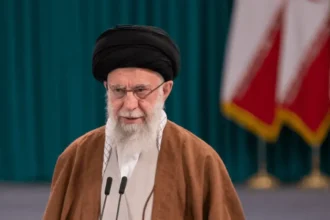Following the arrest of eminent opposition Republican People’s Party (CHP) member Ekrem İmamoğlu, a major challenger to President Recep Tayyip Erdoğan, Istanbul has been rocked. Many believe İmamoğlu’s detention on allegations of corruption and claimed ties to terrorist groups was politically driven. İmamoğlu was expected to be the presidential candidate for the CHP for the 2028 elections, hence the arrest comes at a crucial junctur.
Widespread indignation over his incarceration has resulted from opposition leaders and citizens denouncing what they consider an attempt to stifle political competitors. The arrest of the Istanbul Mayor represents still another chapter in Turkey’s escalating persecution of activists, reporters, and opposition leaders.
How did the people react to the arrest of İmamoğlu?
Thousands of people went to the streets for a second consecutive night to express their disapproval of the Istanbul Mayor’s Arrest despite a four-day protest restriction enforced by the government. From university students to political activists to CHP members marching in sympathy with İmamoğlu, demonstrations broke out throughout Istanbul. Common opposition rallying cries in Turkey, protestors yelled chants like “We are not scared, we won’t be silenced, we will not obey.”
Police responded by dispersing throngs with rubber bullets and tear gas, so raising the hostility between protestors and law enforcement. Still, demonstrators stayed determined in the face of a strong police presence. According to reports, numerous people have been arrested by the authorities for participation in the protests.
What Responses Have Turkish Authorities Made to the Protests?
Arresting scores of people for “provocative” social media remarks judged to inspire public upheaval, the government has strengthened its crackdown on dissent. According to Interior Minister Ali Yerlikaya, 37 people have been arrested; efforts to capture others accused of disseminating materials promoting hatred and animosity are still in progress. Official authorities estimate that over 24 hours, more than 18.6 million posts referencing the Istanbul Mayor’s Arrest had surfaced online.
Authorities have also named 261 “suspect account managers” accused of exploiting social media to stir disturbance. Human rights groups, who assert the Turkish government is suppressing freedom of expression using online surveillance, have strongly denounced this action.
How Have Political Leaders Responded to the Current Events?
Responding to the incident, President Erdoğan said, “They have lost the balance so much that they are in a state to attack our police, hurl threats at judges and prosecutors.” He accused opposition members of acting in theatrics. He discounted the demonstrations as politically driven parades carried out by his adversaries.
On the other hand, CHP leader Özgür Özel spoke in front of supporters outside Istanbul’s city hall criticizing the Istanbul Mayor Arrest as a government-led “coup” against democracy. Declaring that the people had a right to oppose injustice, he exhorted them to keep their peaceful demonstrations going.
Declaring, “These events have gone beyond our parties, political ideals,” a tweet issued on İmamoğlu’s official X (previously Twitter) account urged Turkish people to join in the protest. Now, the process worries our people—your families most especially. Now is the moment to speak up.
What Effects Might This Have on Turkey’s Political Scene?
The arrest of the Istanbul Mayor has heightened worries about democracy in Turkey since detractors claim that Erdoğan’s regime is eradicating political challenges using the court system. Following the CHP’s notable triumphs in the 2023 municipal elections—where the party seized control of major cities including Istanbul and Ankara, therefore marking the first time Erdoğan’s party was vanquished nationally at the ballot box—İmamoğlu’s arrest follows.
Observers worry that the crackdown would not finish with İmamoğlu since other opposition leaders and reporters have also lately been subject to legal action. To show support for İmamoğlu, the CHP has declared intentions for a national symbolic election asking people to cast fictitious votes in districts throughout the nation.
What Has the International Community Said?
With foreign governments and human rights groups voicing worry over Turkey’s democratic backsliding, the Istanbul Mayor Arrest has attracted major worldwide attention. Emphasizing that political arrests compromise democratic values and judicial independence, German Chancellor Olaf Scholz said that the episode would sour Turkey’s ties with the European Union.
The UN has also urged Turkey to respect human rights and let nonviolent protests free from too forceful control. Many foreign observers worry that ongoing political persecution may drive Turkey even more apart from its Western friends.
What Might the Economic Effects Be?
The Istanbul Mayor’s Arrest has caused unfavorable reactions in Turkey’s financial markets; the currency hit a record low and the stock exchange saw notable falls. Concerned about Turkey’s political stability, investors are becoming more wary since government policies can discourage foreign capital.
Extended turmoil and authoritarian policies, according to economic experts, could aggravate inflation and unemployment, further stressing an already precarious economy. Some analysts think Turkey’s present political environment may encourage qualified professionals and businesses to look for chances outside, therefore compromising the nation’s economic future.
Where Should the Opposition Proceed from Here?
The CHP is unflinching in its support of İmamoğlu as their presidential candidate for the 2028 elections even with his arrest. İmamoğlu is the only candidate; the party’s internal vote, in which 1.5 million members will take part, is still under planning.
To show public support, the CHP has also declared intentions for symbolic elections and nationwide demonstrations. Party officials think that any move to constitutionally forbid İmamoğlu from participating in the 2028 elections will only inspire the opposition and raise popular support against the existing government.
This suggests what Turkey’s future holds?
Turkey’s political instability resulting from the events as they are developing fuels worries of more severe authoritarianism. The arrest of the Istanbul Mayor has raised questions on the decline of democratic values since Erdoğan’s government is accused of consolidating power utilizing the court system.
The present state of affairs may have long-term effects for Turkey’s political path given the approaching presidential contest of 2028. Should the opposition stay cohesive and public discontent with the government keep rising, Erdoğan’s ruling party could see even more formidable opposition in next elections.
With many waiting for the next turn in the continuous conflict between democracy and authoritarianism, the globe observes intently as Turkey struggles with political unrest for now.








